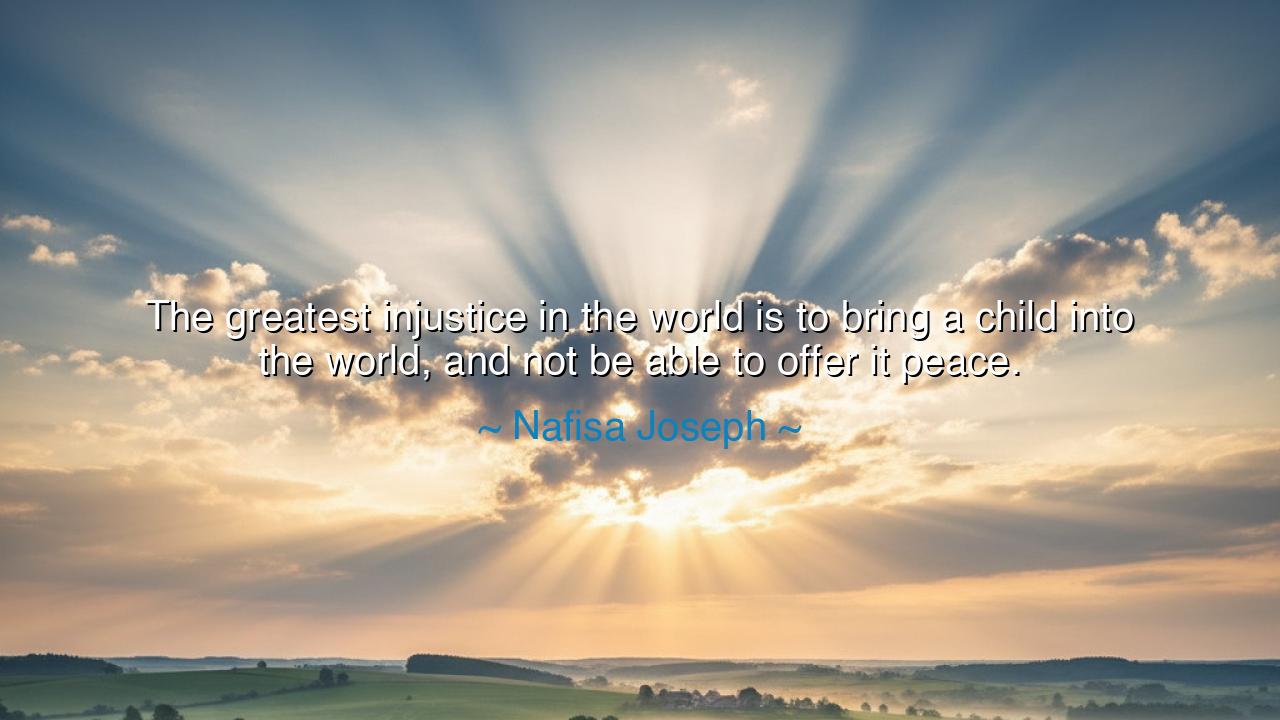
The greatest injustice in the world is to bring a child into the
The greatest injustice in the world is to bring a child into the world, and not be able to offer it peace.






The words of Nafisa Joseph—“The greatest injustice in the world is to bring a child into the world, and not be able to offer it peace”—resound with the grief of compassion and the fire of truth. In them lies the recognition that life, though sacred, carries with it a solemn duty. To bring forth a child is not merely to extend blood or lineage, but to assume the sacred responsibility of protecting innocence. When a child is born into chaos, fear, and violence, the betrayal is not merely of that child, but of humanity itself. For to deny the little ones peace is to steal from them the very ground upon which life is meant to flourish.
The origin of this saying comes from Joseph’s life as an Indian model, actress, and social activist who cared deeply for causes greater than herself. Though known for her grace and beauty, she was also a voice for the voiceless, speaking about the dignity of animals, of women, and of children. In this reflection, she turns her heart toward the most vulnerable of all—children—who bear no guilt, no blame, yet often inherit the burdens of war, poverty, and hatred. Her words echo an ancient lament: that the young should never be made to pay the price of the world’s failures.
History is heavy with examples of this cruel injustice. Think of the children of World War II, huddled in bomb shelters, fleeing burning cities, robbed of safety and of childhood itself. They were not soldiers, nor architects of war, but they bore its deepest scars. Or recall the children of Rwanda during the genocide of 1994, their small eyes beholding horrors no human heart should endure. The world failed them, not because life was denied, but because peace was withheld. These stories bring Joseph’s words into sharp light: the true betrayal is not poverty of wealth, but poverty of safety, love, and peace.
Yet there are also shining examples of those who understood this sacred duty. Consider Maria Montessori, who in the aftermath of war devoted her life to creating schools that sheltered children in learning and gentleness. To her, education was not merely knowledge, but a sanctuary of peace for the young. Or think of Malala Yousafzai, who as a child herself endured violence but rose to proclaim that every child deserves safety, education, and dignity. These figures remind us that while injustice is vast, the fight for peace is holy, and it begins with the care of children.
The meaning of Joseph’s words is both haunting and demanding. She declares that bringing life without offering peace is the ultimate betrayal, for it condemns innocence to suffering it cannot understand. It is a reminder that parenthood is not simply a personal choice, but a covenant with the future—a promise that the new life entrusted to our care will not be abandoned to the storms of violence, neglect, or despair. In her words lies the eternal truth: that the measure of a society is not in its wealth or conquests, but in how it protects its children.
The lesson for us is this: let no one bring forth life without also striving to protect it. To raise children is to become both warrior and shepherd—fighting to shield them from injustice, and guiding them gently toward hope. In our personal lives, this means not only providing food and shelter, but also nurturing environments free from cruelty, neglect, or fear. On a larger scale, it means building communities and nations where children inherit safety, dignity, and opportunity, not war and oppression.
Practically, this calls us to action. Support policies and efforts that defend the vulnerable. Speak out against violence, whether in the home, the street, or the halls of power. Create spaces of gentleness and safety wherever children dwell. And above all, remember that every child is a seed of the future—if planted in peace, it grows into beauty; if planted in fear, it grows into sorrow.
Thus, Nafisa Joseph’s words endure like a sacred oath: “The greatest injustice in the world is to bring a child into the world, and not be able to offer it peace.” Let them be remembered as both warning and call, for they speak to the heart of responsibility. To fail a child is to fail humanity. But to offer peace, even to one small life, is to heal the world. For in the laughter of children safe in peace lies the promise of a better tomorrow.






AAdministratorAdministrator
Welcome, honored guests. Please leave a comment, we will respond soon